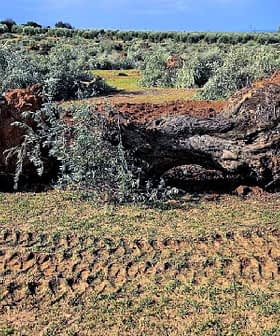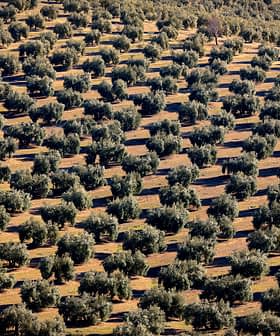Spanish Senators Demand Investigation of Turkish Imports
The search is on to determine whether stolen Syrian olive oil has been imported into Spain under the guise of 'Made in Turkey.' A criminal investigation could be coming.
 Moncloa, the seat of Spanish government.
Moncloa, the seat of Spanish government.Spanish senators have questioned the Spanish Government and the European Commission about the potential import and sale of stolen Syrian olive oil in Spain, following reports of Turkey smuggling Syrian olive oil as Turkish oil. The senators have requested customs reports to identify any imported Turkish olive oil and are considering a potential criminal investigation into the issue to ensure compliance with international law. The origin of imported olive oil is determined by companies through official documentation, but there are concerns about the credibility and safety of olive oil in Spain due to potential fraudulent practices.
Two Spanish senators have formally asked the Government and the European Commission if either entity is aware of any stolen Syrian olive oil currently being imported and sold in Spain.
We will send you the oil as Turkish origin. We send it as if it were made in Turkey.
Earlier this month, numerous reports that Turkey was illegally smuggling Syrian olive oil over its border to be packaged and sold as Turkish olive oil were made public. Bekir Pakdemirli, the Turkish Minister of Agriculture, has acknowledged that the theft of Syrian olive oil is happening, but declined to comment on where the olive oil ended up or how it is being used.
See Also:Olive Oil FraudThe pair of senators – Carles Mulet García and Jordi Navarrete Pla, both of whom are members Compromís, a Valencian political coalition – also tabled a motion asking that the government turn over several recent customs reports that would identify when, where and how much Turkish olive oil has been imported to Spain since the smuggling began.
Valencia is a major port of entry for goods imported to Spain from Turkey and the Middle East.
“In order to avoid these abuses and the possible commercialization of a stolen oil coming from the war in Syria, the coalition has demanded reports of imports of olive oil prepared by the Customs Department with a breakdown by countries of origin and report of the Spanish Consumer Agency, Food Safety and Nutrition on the traceability of Turkish oil, which enjoys advantageous trade agreements with the EU,” the coalition said in an official statement.
Compromís’s European partner, Primavera Europea, has tabled a similar motion with the European Commission.
Swiss Member of Parliament, Bernhard Guhl, was the first European politician to have brought the question of what Switzerland will do if it finds Swiss companies are involved in the illegal trade before his government.
“Switzerland will only do something if Swiss companies are involved in the trade of these stolen olives,” Guhl told Olive Oil Times. “But our government has to answer my questions, so it has to try to get the information about the olives. I’m still waiting for that answer.”
Guhl reckons that he will have those answers by March. Mulet García and Navarrete Pla appear to be following suit in Spain.
However, SOIVRE, Spain’s Official Service of Inspection, Surveillance and Regulation of Exports, have said that they do not have the adequate technology to determine the provenance of imported olive oil.
“Ask the Ministry [of Agriculture] to see if they have any carbon test to find out the origin of an oil,” a SOIVRE employee told El Público, the Spanish news organization that broke the story originally. “Here we only practice the necessary analyzes to comply with the EU regulations, and among them, there is none to confirm their provenance in a reliable manner.”
Determining the provenance of imported olive oil, they said, is up to companies to provide in official documentation that comes in with each shipment. This has changed the focus of Mulet García and Navarrete Plas’ efforts to a potential criminal investigation.
“One hundred percent of the imports that enter Spain are subject to double the tests required by European law,” Rafael Pico Lapuente, the director of the Spanish Association of the Olive Oil Exporting Industry and Commerce (Asoliva), told El Público.
“Regarding the certainty of the origin, the only guarantee is the traceability documents,” he added. “Of course, if there has been some kind of falsification of credentials, the responsibility would be the Government of Turkey or the Turkish companies that took part in it, and not the Spanish companies that hypothetically could acquire without their knowledge any Syrian product with a certificate of Turkish origin.”
According to Pico Lapuente, the latest report from the Spanish government’s customs office, which corresponds to October, showed no Turkish oil had been imported into Spain.
“We will have to be alert to upcoming reports and ask Turkey to comply with the legislation,” Pico Lapuente said.
However, there is evidence that Turkey is not complying with international law and has already sold tins of stolen Syrian olive oil to Cyprus and several of the Gulf States.
According to an audio recording shown to Olive Oil Times and published by El Público, a buyer who said he was in Saudi Arabia is heard discussing a sale of the stolen Syrian olive oil with a wholesaler in Turkey. The buyer does not mention where the final destination of the olive oil will be.
Olive Oil Times has independently verified what is being said in the conversation.
“Is the olive oil really from Afrin?,” the potential buyer asks in Arabic.
“Of course it is,” responds the seller. Neither buyer nor seller are identified in the audio by name.
“So you will send the olive oil from Turkey?,” the buyer asks. “I’m asking you these questions because the imported oil to Europe will be subjected to the tax system.”
“We will send you the oil as Turkish origin,” the seller says. “We send it as if it were made in Turkey.”
There are no confirmed cases that stolen Syrian olive oil has yet been imported into any European countries.
Levent Bilginogulları, the head of the Aegean Exporters Association in Turkey, has denied that Turkey has exported any stolen olive oil to Europe at all.
“Another part on all of these news articles which are not correct is that the packed oil is being exported to EU countries,” he told Olive Oil Times. “Due to ecological reasons, olive oil from Syria and Southeastern Turkey is outside of International Olive Council norms, so it is not possible to export them.”
Ferran Barber, the investigative journalist who broke the news for El Público and has reported on these types of stories for 25 years, told Olive Oil Times that he expects most of the stolen oil will now end up in the Gulf since the story has come to light. However, he did not rule out that the stolen olive oil might have already made it into Spain or Italy.
It is for this reason – the fact that nobody really knows what has or has not happened – that Mulet García and Navarrete Pla will continue pushing for answers from all the relevant authorities and seek punishments for any Spanish or European companies that have broke international law.
“This information and these practices concern the Spanish olive sector due to their potential effects on its credibility and their seriousness regarding food safety and consumer health,” Mulet García said.
“[It is vital] to avoid abuses or fraud such as those described, which discredits our country’s world leadership of olive growing and oil production,” he added.









